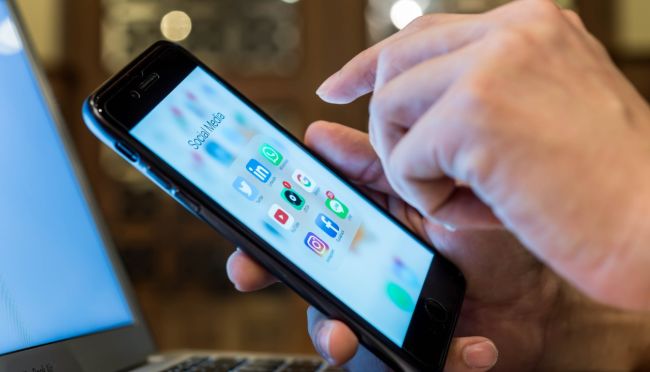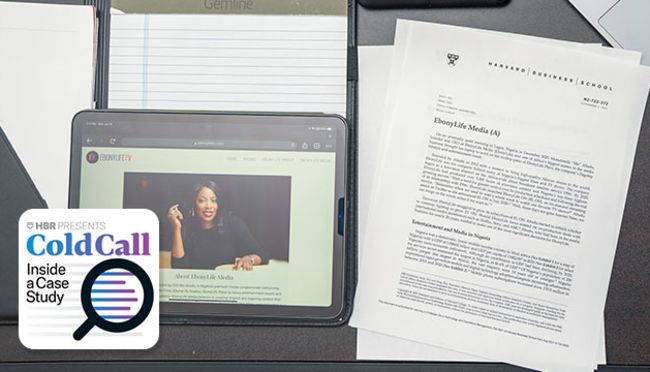Communication →
→

- 06 Nov 2023
- Research & Ideas
Did You Hear What I Said? How to Listen Better
People who seem like they're paying attention often aren't—even when they're smiling and nodding toward the speaker. Research by Alison Wood Brooks, Hanne Collins, and colleagues reveals just how prone the mind is to wandering, and sheds light on ways to stay tuned in to the conversation.
.jpg)
- 31 Oct 2023
- HBS Case
Checking Your Ethics: Would You Speak Up in These 3 Sticky Situations?
Would you complain about a client who verbally abuses their staff? Would you admit to cutting corners on your work? The answers aren't always clear, says David Fubini, who tackles tricky scenarios in a series of case studies and offers his advice from the field.

- 24 Jul 2023
- Research & Ideas
Part-Time Employees Want More Hours. Can Companies Tap This ‘Hidden’ Talent Pool?
Businesses need more staff and employees need more work, so what's standing in the way? A report by Joseph Fuller and colleagues shows how algorithms and inflexibility prevent companies from accessing valuable talent in a long-term shortage.

- 23 Jun 2023
- HBS Case
This Company Lets Employees Take Charge—Even with Life and Death Decisions
Dutch home health care organization Buurtzorg avoids middle management positions and instead empowers its nurses to care for patients as they see fit. Tatiana Sandino and Ethan Bernstein explore how removing organizational layers and allowing employees to make decisions can boost performance.

- 24 Jan 2023
- Research & Ideas
Passion at Work Is a Good Thing—But Only If Bosses Know How to Manage It
Does showing passion mean doing whatever it takes to get the job done? Employees and managers often disagree, says research by Jon Jachimowicz. He offers four pieces of advice for leaders who yearn for more spirit and intensity at their companies.

- 10 Jan 2023
- Research & Ideas
How to Live Happier in 2023: Diversify Your Social Circle
People need all kinds of relationships to thrive: partners, acquaintances, colleagues, and family. Research by Michael Norton and Alison Wood Brooks offers new reasons to pick up the phone and reconnect with that old friend from home.

- 15 Nov 2022
- Op-Ed
Why TikTok Is Beating YouTube for Eyeball Time (It’s Not Just the Dance Videos)
Quirky amateur video clips might draw people to TikTok, but its algorithm keeps them watching. John Deighton and Leora Kornfeld explore the factors that helped propel TikTok ahead of established social platforms, and where it might go next.

- 03 Nov 2022
- Op-Ed
Feeling Separation Anxiety at Your Startup? 5 Tips to Soothe These Growing Pains
As startups mature and introduce more managers, early employees may lose the easy closeness they once had with founders. However, with transparency and healthy boundaries, entrepreneurs can help employees weather this transition and build trust, says Julia Austin.

- 15 Sep 2022
- Research & Ideas
Looking For a Job? Some LinkedIn Connections Matter More Than Others
Debating whether to connect on LinkedIn with that more senior executive you met at that conference? You should, says new research about professional networks by Iavor Bojinov and colleagues. That person just might help you land your next job.

- 08 Sep 2022
- Book
Gen Xers and Millennials, It’s Time To Lead. Are You Ready?
Generation X and Millennials—eagerly waiting to succeed Baby Boom leaders—have the opportunity to bring more collaboration and purpose to business. In the book True North: Emerging Leader Edition, Bill George offers advice for the next wave of CEOs.

- 05 Aug 2022
- Research & Ideas
Why People Crave Feedback—and Why We’re Afraid to Give It
How am I doing? Research by Francesca Gino and colleagues shows just how badly employees want to know. Is it time for managers to get over their discomfort and get the conversation going at work?

- 23 Jun 2022
- Research & Ideas
All Those Zoom Meetings May Boost Connection and Curb Loneliness
Zoom fatigue became a thing during the height of the pandemic, but research by Amit Goldenberg shows how virtual interactions can provide a salve for isolation. What does this mean for remote and hybrid workplaces?

- 13 Jun 2022
- Research & Ideas
Extroverts, Your Colleagues Wish You Would Just Shut Up and Listen
Extroverts may be the life of the party, but at work, they're often viewed as phony and self-centered, says research by Julian Zlatev and colleagues. Here's how extroverts can show others that they're listening, without muting themselves.

- 24 May 2022
- Research & Ideas
Career Advice for Minorities and Women: Sharing Your Identity Can Open Doors
Women and people of color tend to minimize their identities in professional situations, but highlighting who they are often forces others to check their own biases. Research by Edward Chang and colleagues.

- 12 May 2022
- Book
Why Digital Is a State of Mind, Not Just a Skill Set
You don't have to be a machine learning expert to manage a successful digital transformation. In fact, you only need 30 percent fluency in a handful of technical topics, say Tsedal Neeley and Paul Leonardi in their book, The Digital Mindset.

- 08 Feb 2022
- Research & Ideas
Silos That Work: How the Pandemic Changed the Way We Collaborate
A study of 360 billion emails shows how remote work isolated teams, but also led to more intense communication within siloed groups. Will these shifts outlast the pandemic? Research by Tiona Zuzul and colleagues. Open for comment; 0 Comments.

- 08 Feb 2022
- Cold Call Podcast
What’s Next for Nigerian Production Studio EbonyLife Media?
After more than 20 years in the media industry in the UK and Nigeria, EbonyLife Media CEO Mo Abudu is considering several strategic changes for her media company’s future. Will her mission to tell authentic African stories to the world be advanced by distributing films and TV shows direct to customers? Or should EbonyLife instead distribute its content through third-party streaming services, like Netflix? Assistant Professor Andy Wu discusses Abudu’s plans for her company in his case, EbonyLife Media. Open for comment; 0 Comments.
.jpg)
- 11 Jan 2022
- Research & Ideas
Feeling Seen: What to Say When Your Employees Are Not OK
Pandemic life continues to take its toll. Managers who let down their guard and acknowledge their employees' emotions can ease distress and build trust, says research by Julian Zlatev and colleagues. Open for comment; 0 Comments.

- 04 Jan 2022
- Research & Ideas
Scrap the Big New Year's Resolutions. Make 6 Simple Changes Instead.
Self-improvement doesn't need to be painful, especially during a pandemic. Rather than set yet another gym goal, look inward, retrain your brain, and get outside, says Hirotaka Takeuchi. Open for comment; 0 Comments.

Is Your Workplace Biased Against Introverts?
Extroverts are more likely to express their passion outwardly, giving them a leg up when it comes to raises and promotions, according to research by Jon Jachimowicz. Introverts are just as motivated and excited about their work, but show it differently. How can managers challenge their assumptions?